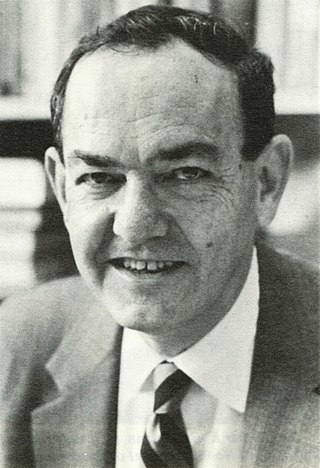Related Research Articles

Herbert Alexander Simon was an American political scientist whose work also influenced the fields of computer science, economics, and cognitive psychology. His primary research interest was decision-making within organizations and he is best known for the theories of "bounded rationality" and "satisficing". He received the Nobel Memorial Prize in Economic Sciences in 1978 and the Turing Award in computer science in 1975. His research was noted for its interdisciplinary nature, spanning the fields of cognitive science, computer science, public administration, management, and political science. He was at Carnegie Mellon University for most of his career, from 1949 to 2001, where he helped found the Carnegie Mellon School of Computer Science, one of the first such departments in the world.

Kevin Warwick is an English engineer and Deputy Vice-Chancellor (Research) at Coventry University. He is known for his studies on direct interfaces between computer systems and the human nervous system, and has also done research concerning robotics.

A business school is a higher education institution or professional school that teaches courses leading to degrees in business administration or management. A business school may also be referred to as school of management, management school, school of business administration, college of business, or colloquially b-school or biz school. A business school offers comprehensive education in various disciplines related to the world of business.

The University of Warwick is a public research university on the outskirts of Coventry between the West Midlands and Warwickshire, England. The university was founded in 1965 as part of a government initiative to expand higher education. The Warwick Business School was established in 1967, the Warwick Law School in 1968, Warwick Manufacturing Group (WMG) in 1980, and Warwick Medical School in 2000. Warwick incorporated Coventry College of Education in 1979 and Horticulture Research International in 2004.
Behavioral economics is the study of the psychological, cognitive, emotional, cultural and social factors involved in the decisions of individuals or institutions, and how these decisions deviate from those implied by classical economic theory.
Victor Harold Vroom was a Canadian psychologist and business school professor at the Yale School of Management.

The University of Strathclyde is a public research university located in Glasgow, Scotland. Founded in 1796 as the Andersonian Institute, it is Glasgow's second-oldest university, having received its royal charter in 1964 as the first technological university in the United Kingdom. Taking its name from the historic Kingdom of Strathclyde, its combined enrollment of 25,000 undergraduate and graduate students ranks it Scotland's third-largest university, drawn with its staff from over 100 countries.
Policy is a deliberate system of guidelines to guide decisions and achieve rational outcomes. A policy is a statement of intent and is implemented as a procedure or protocol. Policies are generally adopted by a governance body within an organization. Policies can assist in both subjective and objective decision making. Policies used in subjective decision-making usually assist senior management with decisions that must be based on the relative merits of a number of factors, and as a result, are often hard to test objectively, e.g. work–life balance policy. Moreover, Governments and other institutions have policies in the form of laws, regulations, procedures, administrative actions, incentives and voluntary practices. Frequently, resource allocations mirror policy decisions.

Thomas Galloway Dunlop du Roy de Blicquy Galbraith, 2nd Baron Strathclyde,, known informally as Tom Strathclyde, is a British Conservative politician. Lord Strathclyde served in the political role of Leader of the House of Lords from the 2010 general election until January 2013 and as Chancellor of the Duchy of Lancaster, having been Leader of the Opposition in the House of Lords (1998–2010).

James Gardner March was an American political scientist, sociologist, and economist. A professor at Stanford University in the Stanford Graduate School of Business and Stanford Graduate School of Education, he is best known for his research on organizations, his seminal work on A Behavioral Theory of the Firm, and the organizational decision making model known as the Garbage Can Model.

The Strathclyde Business School (SBS) is one of four faculties forming the University of Strathclyde in Glasgow, Scotland. Founded in 1973, but tracing its history back to the establishment of the Royal College of Science and Technology's Department of Industrial Administration in 1947, the school is located on Cathedral Street within the John Anderson campus of the university. It offers courses for business education and management development.

Richard H. Thaler is an American economist and the Charles R. Walgreen Distinguished Service Professor of Behavioral Science and Economics at the University of Chicago Booth School of Business. In 2015, Thaler was president of the American Economic Association.

Warwick Business School (WBS) is the business school of the University of Warwick and an academic department within the Faculty of Social Sciences. It was established in 1967 as the School of Industrial and Business Studies. The business school offers undergraduate, and postgraduate degree programs, and non-degree executive education for individuals and companies.
The Doctor of Engineering is a professional doctorate in engineering and applied science. An EngD is a terminal degree similar to a PhD in engineering but applicable more in industry rather than in academia. The degree is usually aimed toward working professionals.

Andrew Oswald is a Professor of Economics and Behavioural Science at the University of Warwick, England. He is an ISI highly cited researcher and has been a professorial fellow of the ESRC. He is currently a member of the board of reviewing editors of Science. He held previous posts at Oxford, the London School of Economics, Princeton, Dartmouth and Harvard. Andrew Oswald serves as the chair of the IZA Institute Network Advisory Group.
A Bachelor of Management or a Bachelor of Management Studies is an undergraduate degree program offered by numerous universities worldwide. This program equips students with the knowledge and skills necessary to assume managerial roles in a variety of organizations. It provides a solid foundation in organizational behavior and human resource management, while also allowing students to specialize in specific areas of interest through elective courses such as labor-management relations, negotiation, leadership, conflict resolution, compensation systems, and organizational development. Additionally, this degree program provides insights into how organizations function, how they are managed, and their interactions with object-oriented programming using C++ and data structures in both national and international environments.
Graham Loomes, is a British economist and academic, specialising in behavioural economics. Since 2009, he has been Professor of Economics and Behavioural Science at the University of Warwick. He previously worked at the University of Newcastle, the University of York and the University of East Anglia.
Valerie Belton, commonly known as Val Belton, is a retired professor of management science at University of Strathclyde. She is a researcher who has worked on the design and application of multi-criteria decision making (MCDM) approaches for over 30 years. She co-authored a book on this field Multicriteria Decision Analysis: An Integrated Approach, that was released in 2002. She has attempted to incorporate multi-criteria decision analysis with problem structuring techniques, system dynamics, and other analytical approaches. She has a number of scholarly articles to her name and served as the editor of the journal Multi-Criteria Decision Analysis.
The Journal of Behavioral Decision Making is a peer-reviewed academic journal covering the study of psychological decision-making processes. It was established in 1988 and is published five times per year by John Wiley & Sons. The editor-in-chief is George Wright. According to the Journal Citation Reports, the journal has a 2020 impact factor of 2.438, ranking it 52nd out of 83 journals in the category "Psychology, Applied".

Terry Oroszi is an American author. She is a Professor and Vice Chair at Wright State University.
References
- ↑ "Professor George Wright". University of Strathclyde. Retrieved 1 July 2019.
- ↑ "George Wright". University of Strathclyde. Retrieved 1 July 2019.
- ↑ Wright, George; Yates, J. Frank (January–March 1988). "Editorial". Journal of Behavioral Decision Making. 1 (1): 1–4. doi:10.1002/bdm.3960010102.